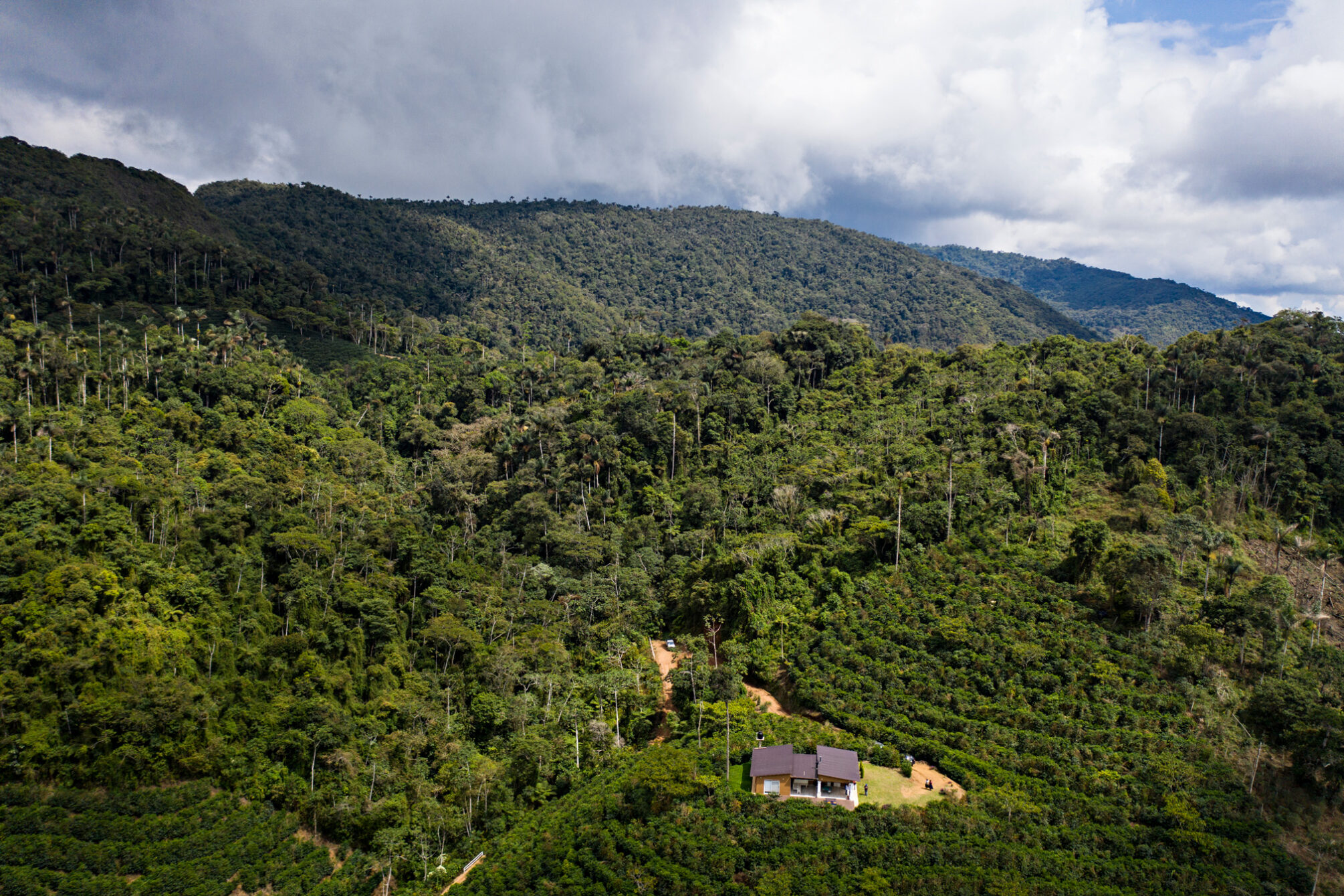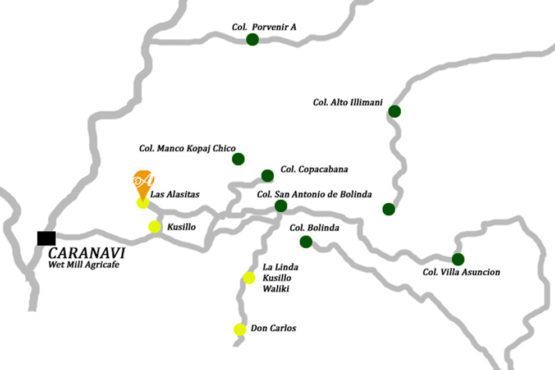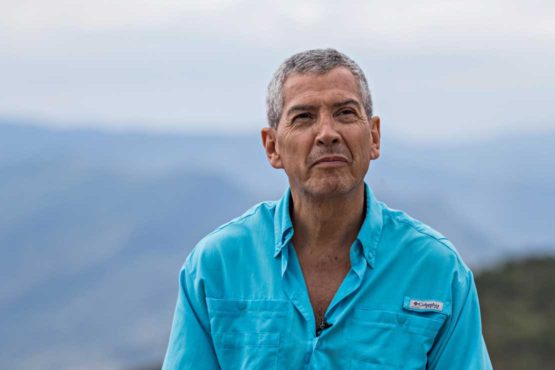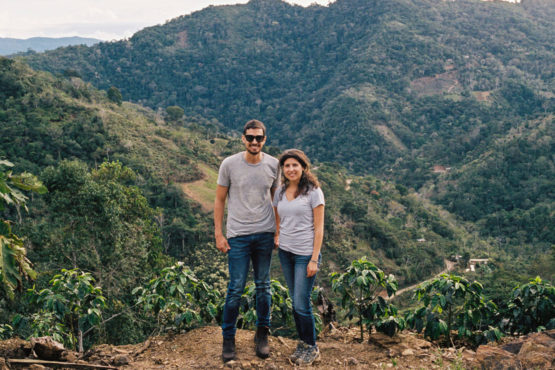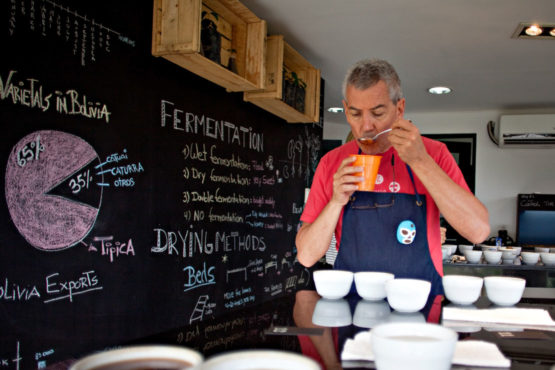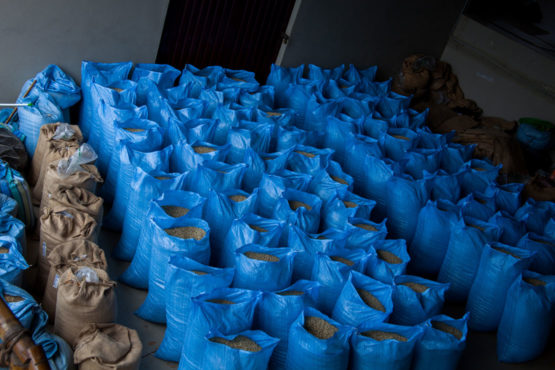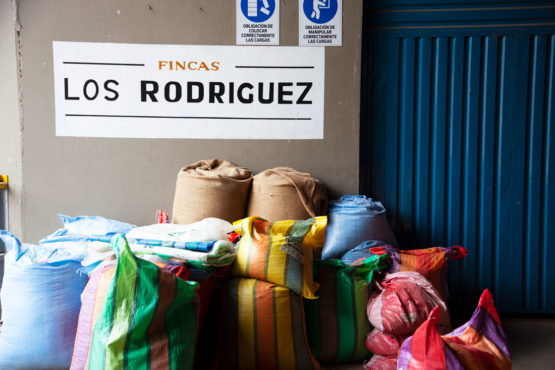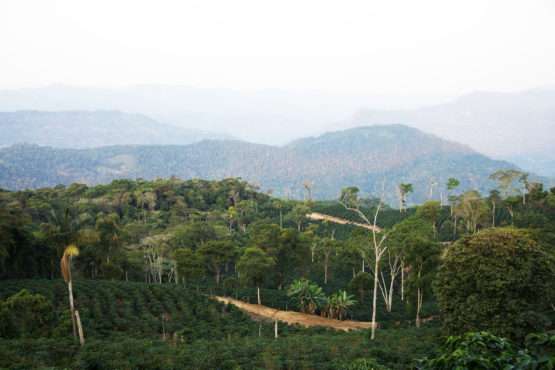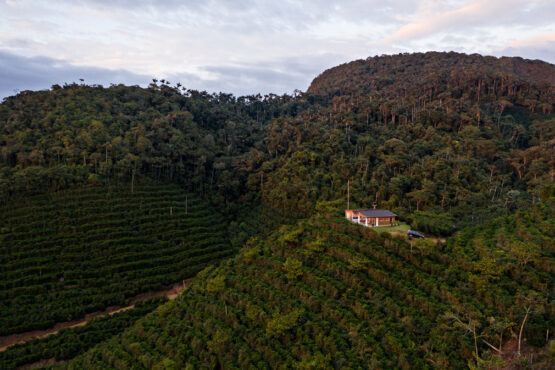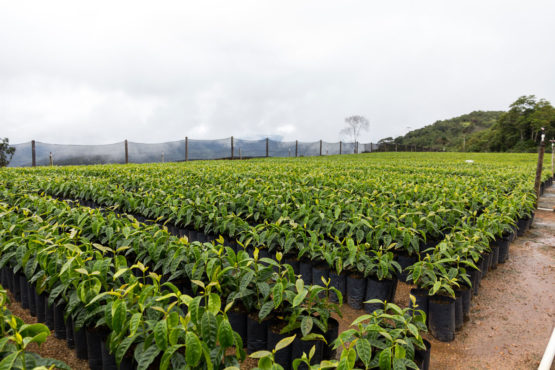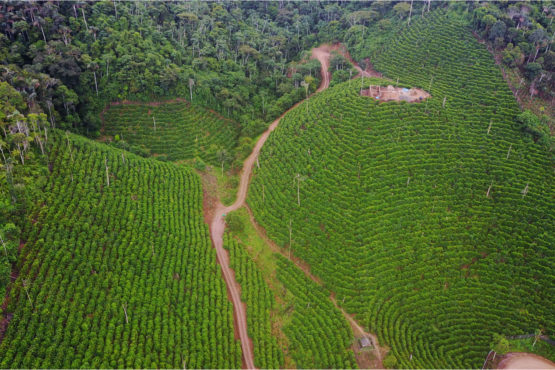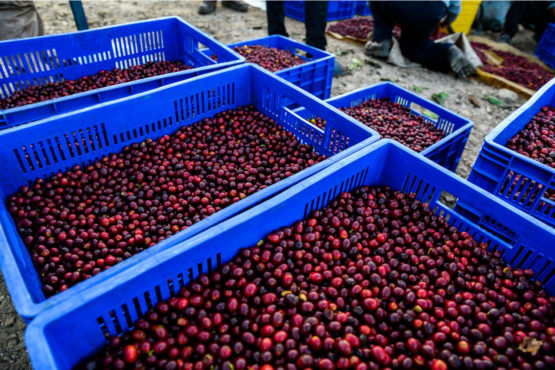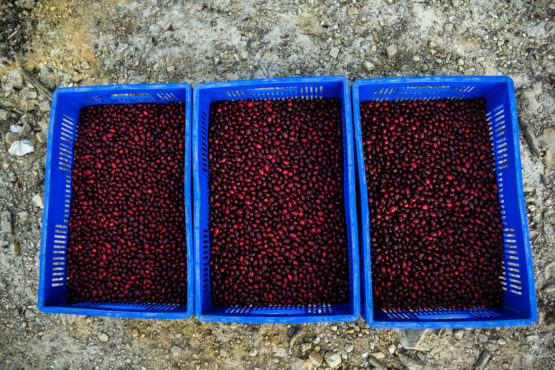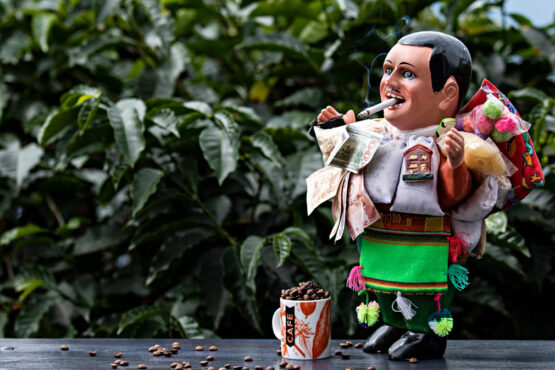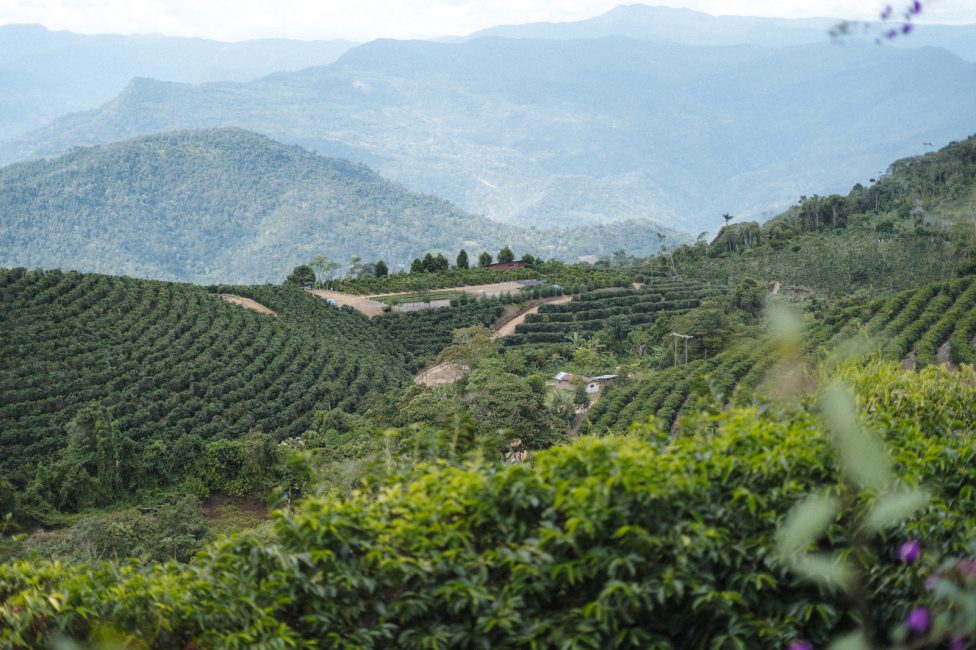Las Alasitas Gesha
Abundantly floral, with jasmine, orange blossom and lemon fragrance. Nectarine, white grape and lychee in the cup. Elegant and complex.
This tiny 180kg Gesha micro-lot comes from Las Alasitas, a small farm owned by Pedro Rodriguez. Over the last decade, Rodriguez has worked tirelessly to build the production of, and market for, Bolivian specialty coffee, helping hundreds of local farmers recognise and realise the potential of their land and crops.
Las Alasitas is located in the colony of Bolinda, which lies in a lush, steep mountain valley around 10 kilometres outside of the town of Caranavi. The colony of Bolinda was founded 52 years ago and was once known as ‘Bolivia Linda’ or ‘Beautiful Bolivia’. Over the years this name was shortened to Bolinda, and it is now one of the larger settlements in the area.
Coffee production in Bolivia is, and always has been, very small. Pedro began his journey in coffee by working with small producers in Caranavi, building a wet mill to process their coffee, and educating producers to selectively handpick their cherries. He also started to process small micro-lots from each of the producers, and because of the unique combination of heirloom varieties, rich soil and incredibly high altitudes, the results were outstanding.
However, despite increased international recognition for its quality, coffee production in Bolivia began to rapidly decline over a very short period of time for many reasons. Some farmers switched to coca – grown for the drug trade and illegal to produce in Caranavi – because it provided them with a high year-round income. For those still in coffee, their yields were also declining as a result of ageing coffee plantations, unsophisticated farming techniques, and leaf rust. The combination of these factors resulted in the nation’s coffee production decline by more than half.
In 2012, as leaf rust started to obliterate the production in many small farms, Pedro and his family began to invest in their own plantations, fearing that coffee production in Bolivia would disappear completely. This, they recognised was critical in order to guarantee a minimum level of supply and thus ensure the future sustainability of their business. They acquired land in Caranavi, near their Buena Vista mill and created their first farm, Finca La Linda. “This is where the dream started,” Pedro says.
Today Agricafe has 12 farms, and around 130 hectares of coffee under the banner of ‘Fincas Los Rodriguez’. Seven of these are in Caranavi, in the department of La Paz, and the remaining five are in Samaipata, in the department of Santa Cruz in Bolivia’s east.
The Rodriguez family’s approach to coffee production has been extremely methodical, innovative and scientific. Along the way, they consulted with leading specialty coffee agronomists from around the world to help them produce exceptional coffee and build sustainable and healthy farms. A wide range of varieties have been trialed, along with different farming techniques to optimise quality and output. They have carefully documented their findings at every step of the way, and continue to innovate and invest in improvements to produce the very best quality coffee they can.
The Rodriguez farms are some of the most organised and beautiful we have come across. Coffee is well spaced in neat rows and meticulously organised by variety, making picking and lot separation much easier to manage than on more traditional farms in the region. The farms are vibrant, luscious and healthy, and produce exceptional quality and yields.
ABOUT LAS ALASITAS
Las Alasitas was planted in 2014 and is 20.6 hectares in size. The farm sits at about 1,642 metres above sea level and has incredible views over the Los Rodriguez farms and mountains beyond. The views are so special that the family have built a house at the top of the farm called La Casita, to welcome friends and guests, who come to enjoy the farm at sunset and sunrise, coffee in hand.
The high altitude of Las Alasistas helps to ensure a slow maturation of the cherry because of the stable night-time temperature and mild day temperatures. The slow maturation leads to an increased concentration of sugars in the cherry and bean, which in turn helps to produce a sweeter cup of coffee.
Pedro and his family have invested a lot of time and effort into trying to make each of their plantations a ‘model’ farm that other producers in the area can learn from. Their learnings have also been shared with local producers through a training program that the family has developed called Sol de la Mañana.
Pedro has trialled several varieties on this farm, including Gesha, San Bernardo, Caturra and Java. This Gesha micro-lot is incredibly special and stood out on the cupping table with its incredible sweetness, pretty floral aroma and complex fruit character.
HOW THIS COFFEE WAS PROCESSED
At Las Alasitas, Pedro hires pickers from the Villa Rosario community to carefully handpick the coffee during the harvest. These pickers are trained to select only the very ripest cherries, and multiple passes are made through the farm throughout the harvest to ensure the coffee is picked at its prime. Selective picking is always very important and is particularly important for special micro-lots like this one, to ensure a very sweet and clean cup. The Rodriguez family has found that the very ripest (almost purple) cherries provide the best cup.
Pedro is always innovating and trialing different processing techniques and in this case the coffee was processed with a strong influence from the wine industry. After being picked and weighed, the coffee cherries are pulped and then fermented in a sealed, anaerobic tank. The coffee was then laid out to dry on raised beds and regularly turned for up to 48hrs, before being finished in a mechanical dryer for around 35hrs, with temperatures no higher than 40˚C. When the coffee reached 16% humidity it was rested for five hours in a silo, and then carefully dried until it reached 11.5% humidity.
Once the coffee was dry, it was transported to La Paz where it was rested, and then milled Agricafe’s dry mill, La Luna. At this state-of-the-art mill, the coffee is meticulously hulled and sorted using machinery and also a team of sorters who carefully sort the coffee by hand under UV and natural light. The mill is one of the cleanest and most impressive we have seen- you can read more about it here.
WHATS IN A NAME?
Alasitas means “Buy Me” in the local Aymara native language. The name comes from a festival called Alasitas, which is a festival of desires and honours the Andean god of abundance.
Starting at noon on the 24th of January every year (which also happens to be Pedro Pablo’s birthday!) Bolivia’s capital, La Paz, comes alive with a sense of promise, wishfulness and whimsy. The scene may seem strange to someone unfamiliar with this cultural event that has its roots in pre-Colombian Aymara traditions and has evolved over the centuries to incorporate elements of Catholicism and Western consumerism, but to locals, Alasitas is an important fixture in their calendar.
During the festival, thousands flock to La Paz to buy miniature items – cars, hours, university degrees, suitcases full of cash, potential spouses – of everything they want in the coming year. It can be something material or something that brings luck – like a chicken that will help you find love or a frog that will bring you good fortune. All miniatures are blessed by a Yatiri (a spiritual leader in Aymara culture) and offered to the Ekeko, the Andean god of abundance. Miniatures are exchanged with family and friends, in a hope that their dreams will be realised, and in turn, you will also be blessed with abundance.
Reciprocity is at the heart of the Alasitas festivals and it is for this reason that it is a fitting name for the farm. The Alasitas farm is one of the largest the Rodriguez’s own in Caranavi and was created with the vision of becoming a model farm local coffee growers could learn from, and be inspired by, thus helping them realise the vast potential of their land and crops.
WANT TO KNOW MORE?
Read about Pedro Rodriguez journey in coffee here, and about Agricafe’s Sol de la Mañana program here and about Bolivian coffee more generally here.
